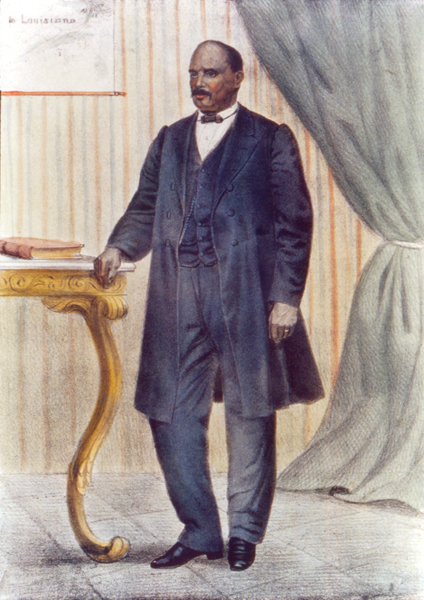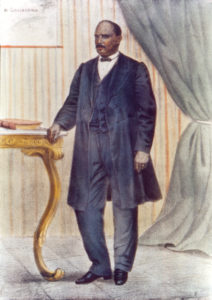Oscar Dunn
Oscar James Dunn became one of the first Black men to serve in an executive political position in the United States when he was elected lieutenant governor of Louisiana in 1868.

Courtesy of the Historic New Orleans Collection.
Oscar J. Dunn. Currier & Ives (publisher)
Oscar James Dunn became one of the first Black men to serve in an executive political position in the United States when he was elected lieutenant governor of Louisiana in 1868. It was at this time—a short period during Reconstruction—that many African Americans ascended to power in the state’s highest offices. In an era when Dunn’s race alone would have drawn derision, even his political opponents reported that he was incorruptible and a man of integrity. No political scandals were ever brought against him, which was rare for a politician in the chaotic post-Civil War environment of the defeated Confederacy. His early death at age forty-nine perhaps prevented him from being a United States senator or potential vice-presidential candidate.
Dunn was born in 1826; his stepfather, James, had been emancipated in 1819 by James H. Caldwell, founder of the St. Charles Theatre and the New Orleans Gas Light Company. James subsequently purchased the freedom of his wife, Maria, and their two children, Oscar and Jane, in 1832. James was a carpenter and Maria operated a boarding house for actors in New Orleans. Oscar apprenticed as a plasterer. He also became a respected guitarist and taught private lessons.
Political Calling
During the Civil War, Dunn did not serve in an active capacity. Near the end of the four-year conflict, he opened an employment agency where freedmen described as “good servants and field hands” were hired out to residents of New Orleans and surrounding parishes. Working in collaboration with the newly freed laboring class of African Americans, Dunn championed their struggle for freedom and became a strong advocate of Black land ownership, education for all Black children, and equal protection laws under the Fourteenth Amendment. He became secretary of the Advisory Committee of the Freedmen’s Saving and Trust Company of New Orleans, a branch of the national agency, and was on the board of the Louisiana Association for the Benefit of Colored Orphans. In 1866, he organized the People’s Bakery, an enterprise owned and operated by the Louisiana Association of Workingmen.
Dunn’s sympathy and desire to aid the cause of freedom and universal suffrage would be a stepping stone into politics and elective office. Reconstruction-era politics were brutal and often resulted in violent outbreaks across the defeated Confederacy as freedmen, carpetbaggers, and Radical Republicans began to wrest power from the white supremacist establishment of the antebellum South. A dispute between President Andrew Johnson and Congress came to a head after violent riots and massacres of Black people in Memphis and New Orleans when the forces in Congress who blamed the South for the Civil War won a majority. The enactment of Reconstruction Acts (1867) called for five military districts with commanders and the registration of Black men as voters as well as a new state constitution—with federal approval—before states could be readmitted to the Union. Louisiana and Texas comprised the Fifth District, with General Philip H. Sheridan as commander. In August of that year, Sheridan appointed Dunn to the City Council of New Orleans. Dunn exhibited a “clear vision of the city’s civic needs,” observed biographer A. E. Perkins. It was Dunn’s acumen as a councilman that brought about public education for the city and later for the state. He chaired a committee charged with altering Article 5, which addressed the enrollment age of children attending public schools. He set the ages between 6 and 18 without distinction of color and placed responsibility for education on the council. Although the resolution was laid on the table, his move to enact such an ordinance was realized in the Constitutional Convention of 1867–68, when a similar law was enacted and become one of the most progressive actions taken in opening all schools to all races. Other issues Dunn took on included the establishment of an efficient firefighting system, the requirement that qualified electors should hold appointments, a reconfiguring of the chain of command at City Hall to place it under the general supervision of the mayor, and the creation of council rules for operation.
Lieutenant Governor
After Congress approved Louisiana’s new constitution, elections to state offices were conducted. In 1868, Dunn would become the candidate for lieutenant governor when the wealthy, multi-racial, and highly educated Francis E. Dumas—the highest-ranking non-white officer in the Union Army and a former slave-owning proprietor of a sugar plantation—refused the nomination. Dunn was drafted and ran on a ticket with gubernatorial candidate Henry C. Warmoth, a carpetbagger from Illinois whom Dunn had befriended. Warmoth and Dunn won the election based on the newly enfranchised Black voting bloc and the exclusion of former Confederates from the polls. As the new state legislature took its oath on June 29, Dunn led a movement to require an additional oath for new legislators. He wanted state senators to take a stringent “test oath” to declare that they had not fought against the US or had aided those who did, and an African American colleague in the House requested the same oath of its members. To avoid a confrontation, a letter from President Ulysses S. Grant resolved the matter by requiring only the oath in the Louisiana Constitution be used in the swearing in of the legislature. Dunn not only discharged his duties as lieutenant governor but also was president of the Metropolitan Police, an integrated militia that protected the Radical Republican administration under Gov. William Pitt Kellogg. Dunn was also a member of the Printing Committee and president of the Board for the Distribution of Pensions to Veterans.
Political Strife
Shortly after the election, Dunn realized that Warmoth was not the friend of freedmen and Louisiana that he had thought. Warmoth’s personal ambitions created divisions within the Republican Party. When he was unable to discharge his duties, Dunn stepped in and performed so well that even his bitter opponents in the Democratic press complimented his skills. The acrimonious factional strife between the governor and the lieutenant governor widened when Warmoth was unable to control the Executive Committee and its leadership fell to Dunn. When Dunn captured the Republican State Convention’s chairmanship, some historians claim that he was on track to become governor of Louisiana in the 1872 election. From that post, many believe he would have been elected to the US Senate and then eventually would have become a potential choice for vice president.
The “Customhouse Group” branch of the Republican Party, which opposed Warmoth, included numerous federal appointees and had the support of President Grant, whose wife Julia’s brother-in-law, James F. Casey, was collector of customs. Along with US Marshal Stephen B. Packard, the group moved to abandon Warmoth. Many accused him of appointing Democrats to key positions, and his veto of a civil rights bill and other key legislative efforts rankled more progressive Republicans. The governor’s supporters withdrew and formed a “rump” convention that was disapproved by President Grant and most Republican state officials.
Mysterious Death
At this critical point in Reconstruction, on November 20, 1871, Dunn became violently ill. Within two days he was dead. Speculation and unanswered questions surrounded his untimely death. Some researchers say it was caused by foul play, with poisoning most assumed to be the cause. Four doctors were called at various points during his mysterious illness; all four physicians pronounced Dunn’s cause of death as “congestion of the brain.” One doctor added an additional statement that said death was due to excessive vomiting.
In 1866 Dunn had married Ellen Boyd Marchand, a widow. He adopted her three children, Fannie, Charles, and Emma. The couple had no children of their own. His funeral was held at St. James African Methodist Episcopal Church on North Roman Street. Mississippi Secretary of State Reverend James Lynch delivered the eulogy. The twelve-block-long funeral procession was reportedly witnessed by approximately fifty thousand people along Canal Street. The Louisiana State House, public schools, city hall and all federal buildings were closed as a sign of respect. Dunn was interred at St. Louis Cemetery No. 2.
